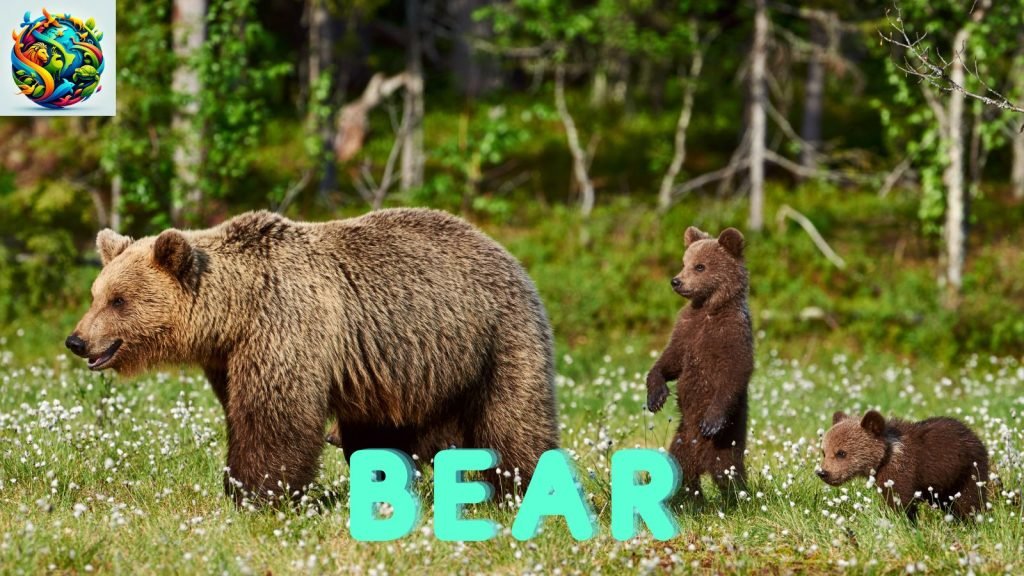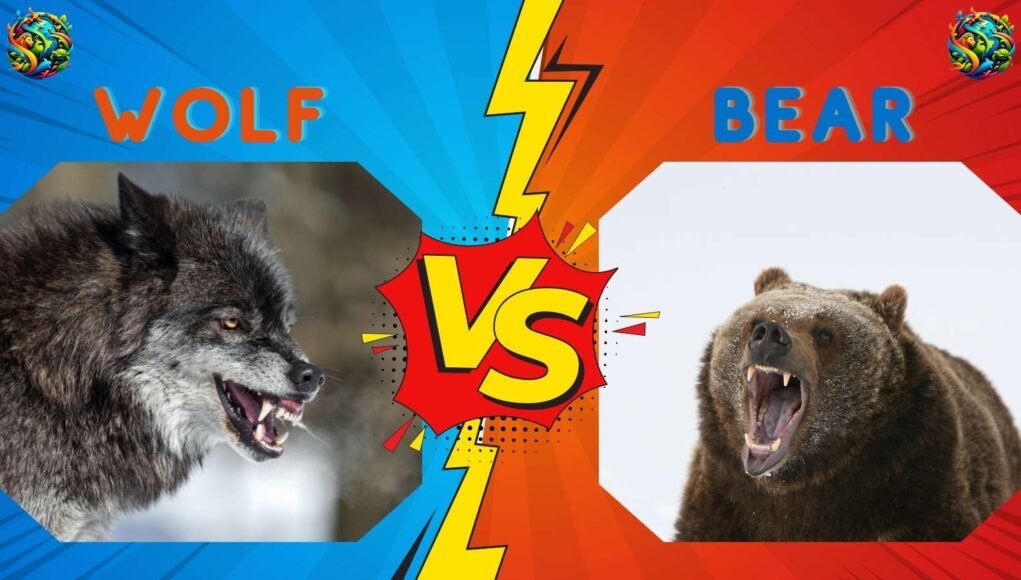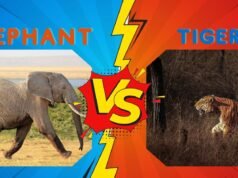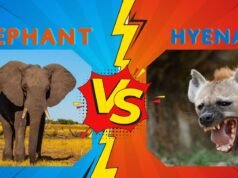Wolf vs Bear: Strength vs Strategy 🐺🆚🐻
The wolf and the bear are two of the most powerful and respected predators in the wild. While wolves are intelligent pack hunters that rely on teamwork and endurance, bears are solitary giants, built for raw strength and resilience.
But what happens when these two incredible predators clash? Can a wolf use its speed and intelligence to outmaneuver the bear, or would the bear’s sheer power make it an easy victory?
Let’s break down their physical abilities, combat skills, and survival tactics to determine the likely winner in a one-on-one fight. Wolf vs Bear
Basic Information on the Animals (Wolf vs Bear)
The Wolf

Scientific Name: Canis lupus
Habitat: Forests, tundras, and grasslands across North America, Europe, and Asia
Social Behavior: Pack hunters, strong social hierarchy
- Size: Weighs 70 to 150 pounds (32-68 kg) and reaches 4 to 6 feet in length (including the tail).
- Diet: Carnivorous, hunting elk, deer, bison, and smaller mammals.
- Hunting Strategy: Wolves use teamwork, endurance, and intelligence to wear down prey.
- Weaponry: Bite force (400 psi), sharp canine teeth, and incredible stamina.
- Speed: Can run at 35 mph (56 km/h) for short bursts but excels in long-distance endurance.
The Bear

Scientific Name: Ursidae (Varies by species, but we’ll compare a Grizzly Bear 🐻)
Habitat: Forests, mountains, and tundras of North America and Eurasia
Social Behavior: Solitary, territorial
- Size: Weighs 600 to 900 pounds (270-400 kg), with some reaching over 1,500 pounds (680 kg).
- Diet: Omnivorous, eating fish, mammals, berries, roots, and even carrion.
- Hunting Strategy: Uses ambush tactics and brute force to overpower prey.
- Weaponry: Bite force (975-1,200 psi), 5-inch-long claws, and powerful forearms.
- Speed: Can sprint at 35 mph (56 km/h) for short distances.
Key Comparisons of Wolf vs Bear
Strength & Power
- Wolf: Wolves are strong for their size, capable of biting through bone, but they rely on group hunting rather than raw strength.
- Bear: Bears are massive powerhouses, able to crush bones with their jaws and deliver devastating swipes with their claws.
Winner: Bear (A bear outmuscles a wolf in every way).
Bite Force & Weaponry
- Wolf: Bite force of 400 psi, designed for holding onto prey and ripping flesh.
- Bear: Bite force of 975-1,200 psi, strong enough to crush bones and skulls.
Winner: Bear (Its bite is nearly three times stronger than a wolf’s).
Speed & Agility of Wolf vs Bear
- Wolf: 35 mph sprint speed, excellent at long-distance running and quick maneuvering.
- Bear: 35 mph sprint speed, but lacks agility compared to a wolf.
Winner: Wolf (Wolves are more agile and have better endurance).
Defense & Durability 🛡️
- Wolf: Wolves have thick fur, but their relatively thin skin makes them vulnerable to strong attacks.
- Bear: Bears have thick fur, dense muscles, and fat layers, making them incredibly durable.
Winner: Bear (A wolf’s attacks wouldn’t do much damage to a bear’s thick hide).
Fighting Skills & Tactics 🎯
- Wolf: Wolves are smart, tactical, and skilled hunters, but they rely on teamwork rather than direct one-on-one combat.
- Bear: Bears are territorial and aggressive fighters, often engaging in brutal dominance battles with other bears.
Winner: Bear (Wolves avoid solo fights, while bears are experienced in one-on-one combat).
Fight Scenario: Wolf vs Bear
Scenario 1: One-on-One Fight
- In a one-on-one battle, the wolf has no real chance against a full-grown bear.
- A single swipe from the bear’s giant claws could instantly kill or seriously injure a wolf.
- The wolf might try to bite, but the bear’s thick fur and muscle make it nearly invulnerable to a wolf’s attacks.
- The bear’s sheer strength and bite force would end the fight quickly.
Winner: Bear (A wolf cannot take down a bear alone).
Scenario 2: A Pack of Wolves vs a Bear
- A wolf pack could theoretically bring down a smaller bear by attacking from multiple angles.
- Wolves would use their speed and endurance to tire the bear out over time.
- However, a full-grown grizzly bear would likely kill several wolves before succumbing to exhaustion.
Winner: Bear (Most of the time), but a large wolf pack might be able to outlast and injure a bear over time.
Final Verdict: Who Would Win? Wolf vs Bear
| Category | Winner |
|---|---|
| Strength & Power | Bear |
| Bite Force & Weaponry | Bear |
| Speed & Agility | Wolf |
| Defense & Durability | Bear |
| Fighting Skills & Tactics | Bear |
| One-on-One Fight | Bear |
| Wolf Pack vs. Bear | Bear (in most cases) |
Ultimate Winner: Bear 🏆
Why Does the Bear Win?
- Overwhelming Size & Strength → A bear is 5 to 10 times heavier than a wolf.
- Superior Bite Force → A bear’s bite is nearly 3 times stronger than a wolf’s.
- Thick Skin & Durability → A wolf cannot penetrate a bear’s thick fur and muscle.
- Experience in Combat → Bears regularly fight other bears, while wolves rely on pack hunting.
- A Single Strike Could Kill a Wolf → One paw swipe could break a wolf’s bones or kill it instantly.
When Could a Wolf Win? Wolf vs Bear
- Only in a large pack by wearing down a smaller or weaker bear over time.
- A lone wolf has no real chance against an adult bear.
Final Thought: Strength vs Strategy
A bear vs wolf fight is extremely one-sided in a one-on-one battle. Bears are simply too large, powerful, and durable for a single wolf to handle.
However, a wolf pack could potentially chase off or exhaust a bear in the right circumstances. But in most cases, bears dominate wolves in direct confrontations.
What Do You Think?
Could a pack of wolves take down a bear, or is the bear simply too powerful for even the smartest predators? Let me know your thoughts!




